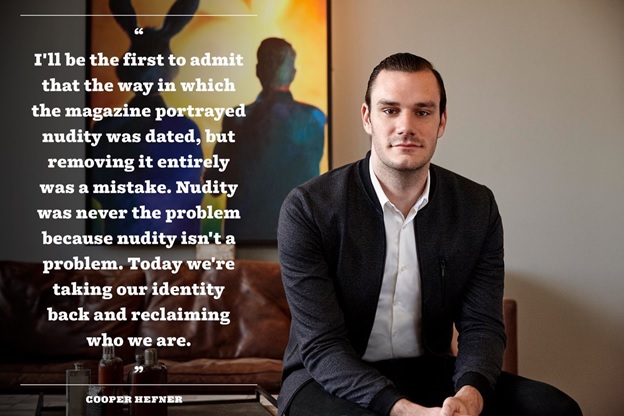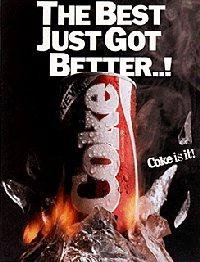
Earlier this week, Cooper Hefner (son of Hugh), took to Twitter to boldly announce that nudity is back at his dad’s legacy men’s magazine, Playboy.
You might not even know that Playboy did away with nudity – female nudity – less than one year ago. This policy was put in place by a former Playboy CEO. Needless to say, it has not gone well. Now, a Hefner is back in control of the publication, apologies have been issued, and the magazine is attempting to right itself.
Our company did quite a bit of research for Playboy back in the ‘90s before the magazine and the brand fell on hard times. With the advent of the Internet, their team faced a serious dilemma, attempting to determine how their core product could compete with online porn and other familiar products spawned by the World Wide Web. Clearly, Playboy was one of the first brands to be upended by the sweeping changes ushered in by the Internet.
I have told the story about how we conducted a series of focus groups among their advertisers to better understand the barriers of buying ads in a risqué men’s magazine. Even during those days, nudity was problematic for their ad sales team. It was easier and safer for media buyers and account managers to reach men via magazines like Esquire and Sports Illustrated.
As one of their sales managers asked in a subsequent brainstorm meeting, “Isn’t there a way for us to publish the magazine with a little less nudity?”
At the time, it struck me as a ludicrous question because it was the fuel that drove Playboy‘s readership, as well as their defining rabbit head logo. Nudity was what Playboy was famous for. So, it turns out that in 2016, that sales manager got his wish, and the results weren’t good.
And that’s the first object lesson of this experience. When you stray from the core elements that define your brand essence, you lose the basic reason why consumers appreciated you in the first place. You’re messing with the formula that drives loyalty and repeat business. Your raison d’être.
And the second reminder is that when the sales department or media buyers have too big a say in dictating a brand’s direction, it’s often the first step down the path of the road to oblivion. I remember hearing the same thing from radio sales departments back in the Howard Stern terrestrial radio days. “If only Howard would just tone it down a bit…”
Coca-Cola is another storied brand that messed with a good thing. It tasted just fine to the billions around the globe that loved it. But when they had some down sales months, that didn’t stop them from veering away from their core formula to  create “New Coke,” a disastrous product that lasted less than three months. Obviously, they figured it out much faster than Playboy.
create “New Coke,” a disastrous product that lasted less than three months. Obviously, they figured it out much faster than Playboy.
And so it goes with radio. Well-built brands create concrete and well-defined expectations. Programmers know (or eventually learn) why their listeners “hire” their radio stations in the first place. Understanding your role – your “job” – as a radio station goes to the core of everything you do.
Even as improvements or changes are made, it is paramount to never drift away from that brand essence. You can adapt, morph, and modernize a brand, but mess with its core values, and you’re courting trouble.
As Arthur Jensen, the angry TV executive in “Network” intoned, “You have meddled with the primal forces of nature.” And in essence, that was the underlying marketing mistake Playboy made in its effort to go more mainstream. Nudity has always defined Playboy. Take it away, and what’s left of the brand?
Cooper Hefner’s statement is as clear a mea culpa as you’ll hear a brand offer as it returns to its familiar trappings. But he also admitted that Playboy had not adapted to the times when the original decision to ban nudity was made.
 And that’s an essential piece in the brand stability puzzle. Continuing to do what got you to the dance is key to maintaining that essence, but continuing to improve upon it, freshen it up, and add new elements helps ensure your customer base doesn’t take it for granted.
And that’s an essential piece in the brand stability puzzle. Continuing to do what got you to the dance is key to maintaining that essence, but continuing to improve upon it, freshen it up, and add new elements helps ensure your customer base doesn’t take it for granted.
How do you figure that part out? That’s where the research comes into play. In Playboy’s case, they were certainly doing a lot of it in the ‘90s, so how they made the leap into no nudity might be best explained as a misguided directive that came down from the top. It wouldn’t be the first time a former boss was blamed for a lame decision.
But as any marketing pro will tell you, research alone is not the be-all-and-end-all. How it’s interpreted and implemented goes to the heart of the brands that somehow find ways to sustain themselves for decades, rather than those who go down the road that Playboy finds itself on. Whether former readers will return to the storied magazine now remains to be seen. And whether new ones will discover Playboy is an even bigger question.
But the moral of this story is an obvious one – don’t stop doing what got you to the dance.
Just keep making the dance a better user experience.
- What Is It With Female Robot DJs? - April 30, 2025
- Why “Dance With Those Who Brung You” Should Be Radio’s Operating Philosophy In 2025 - April 29, 2025
- The Exponential Value of Nurturing Radio Superfans - April 28, 2025




Great story and a cautionary tale that is easily applied to most unique products including radio formats. In the case of Classic Rock and the music it plays. A music written and recorded in a time of great social upheaval and now sold as the back ground music to your happy days is in need of the occasional small rebellion. Maybe something as big and glorious as a vinyl weekend or two for Tuesday on Wednesday but called two for Tuesday. Or play both versions of Gloria back to back followed by playing them again back to back. I am kidding, kind of, but you know what I mean. Freshen it up with a nod and a smile to the original spirit once in a while. I love radio.
But don’t stray too far from the course. Good suggestions, Dan, and thanks for contributing to the conversation.
The anecdote about sales departments wanting Howard Stern to “tone it down” back in the day reminds me of when I was asked my opinion of the “King of All Media”: Howard knew where the line was that he shouldn’t cross, and with only a few exceptions over the years, he stayed on the “fair” side of that line.
The sales manager at Playboy who wanted “less nudity” forgot where he was working. Playboy was not some X-rated “show-all” magazine … it wasn’t even Penthouse or Hustler, for crying out loud! They have always been a class act and the nudity tastefully presented.
Just like Howard Stern, if a salesperson doesn’t know how to market something that (bottom line) is not offensive to its target audience, then that salesperson is in the wrong business.
And kudos to Cooper Hefner, who obviously already knows one of the rules about integrity, which is to own up honestly to one’s past mistakes (even when you weren’t the one who made the mistake in the first place).
No question, K.M. They fessed up, called it a mistake, and hope to move on. No doubt their world has been online predators, but it sounds like Playboy may be regaining its balance. Appreciate you taking the time to comment.